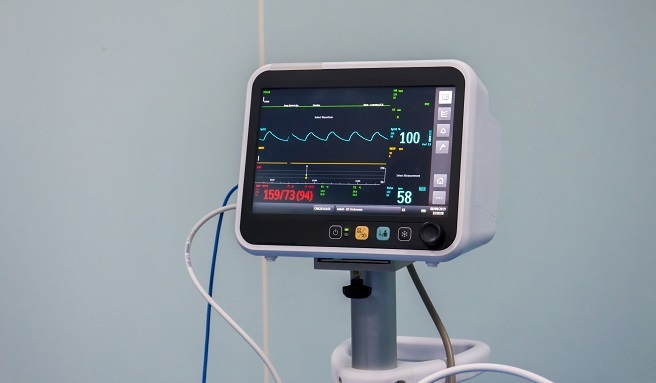
 Data Structure
Data Structure Networking
Networking RDBMS
RDBMS Operating System
Operating System Java
Java MS Excel
MS Excel iOS
iOS HTML
HTML CSS
CSS Android
Android Python
Python C Programming
C Programming C++
C++ C#
C# MongoDB
MongoDB MySQL
MySQL Javascript
Javascript PHP
PHPPhysics
Chemistry
Biology
Mathematics
English
Economics
Psychology
Social Studies
Fashion Studies
Legal Studies
- Selected Reading
- UPSC IAS Exams Notes
- Developer's Best Practices
- Questions and Answers
- Effective Resume Writing
- HR Interview Questions
- Computer Glossary
- Who is Who
What is the full form of FHR?
Introduction
Foetal heart rate (FHR) is the heart rate of the foetus. With the advent of technology, medical science has advanced significantly, and we can now monitor the process of childbirth with incredible accuracy and attention.

Earlier, even the notion of trying to understand what was happening while the foetus developed inside the womb would have been outlandish. But today, not only can we find the gender of the baby with 100% accuracy before birth, but we can also monitor the baby’s development at every stage of the way. Medical check-ups and care during pregnancy is known as prenatal care and one important aspect of prenatal care is the developing baby’s heart rate once the heart has developed.
Definition of FHR
As mentioned, FHR stands for foetal heart rate, which is the heart rate of a developing foetus before the actual moment of childbirth. During the course of prenatal care, doctors and medical professionals regularly check up on FHR. This helps them ensure that the baby is developing properly and is healthy.
There are a number of techniques to monitor foetal heart rate. For instance, ultrasound can be used to detect the heartbeat. More advanced techniques have now been developed and it is possible to electronically monitor foetal heart rate. This helps us gain important information about the baby’s health and well-being.
Importance of monitoring FHR
The processes occurring inside the womb during pregnancy have been quite well- studied. However, that does not mean we can ascertain everything just by the symptoms presented by the mother. This is where FHR comes in.
Generally, foetal heart rate ranges between 120 to 160 beats per minute. Thus, if there are significant deviations from this range, it can indicate to the doctor that something might be wrong with the foetus. For instance, foetal distress, hypoxia, or acidosis can change foetal heart rate and thus, are easily diagnosed.
FHR monitoring is also used in various other settings like antenatal care, labour and delivery, and postpartum care. During labour and delivery, FHR can indicate potential problems with the foetus and help decide the best delivery methods.
Factors affecting FHR
There is a large number of factors that can affect the foetal heart rate while the foetus is developing inside the womb. Generally, a healthy foetus has a heartbeat in the range of 12 0 to 160 beats per minute and variations in this range are common. However, there are factors that can affect FHR. Here are a few common causes −
The age and health of the mother can affect FHR.
The gestational age of the foetus also affects its heart rate.
Further, foetal activity can increase or decrease FHR.
There are some medications affecting FHR.
Major variations in FHR can occur due to abnormalities in the developing foetus.

Apart from that, maternal factors that affect FHR may include stress or anxiety, level of blood sugar of the mother, diseases like fever or infection, low red blood cell count, etc. This is why it is recommended that pregnant women take extra care to avoid diseases and stress since it affects not only them but the baby as well.
Abnormalities in FHR
Broadly, there are three major types of abnormalities generally encountered in foetal heart rate. These are listed below −
Tachycardia − When the heart rate of the foetus drops above 160 beats per minute, the abnormality is classified as tachycardia.
Bradycardia − This is the falling of foetal heart rate below the standard 120 beats per minute.
Variability − Generally, foetal heart rate is expected to be steady, i.e., it shouldn’t vary too far too suddenly. If FHR is varying significantly without any apparent causes, it might be indicating some sort of abnormality.
Conclusion
Foetal heart rate refers to the heart rate of a foetus inside the mother’s womb. It is an important factor of prenatal care that can give an insight into the health and well-being of the foetus. Generally, foetal heart rate ranges between 120 to 160 beats per minute, though it is affected by a number of factors including the foetus’s age. Sudden variations in FHR or high or low foetal heart rate can be indicative of abnormalities, diseases, or foetal stress. Hence, it is important that FHR is monitored and upon noticing any abnormality, appropriate steps be taken.
FAQs
Q1 - What is the formula for FHR?
Ans: Generally, the foetal heart rate follows the following formula: FHR = (10 x Gestational age in weeks) + 30.
Q2 - When does the heart start to develop?
Ans: The baby’s heart starts to develop around the fifth week of pregnancy. At this stage, foetal heart rate is low (approximately 90 to 110 beats per minute.
Q3 - How is foetal heart rate monitored?
Ans: Generally, foetal heart rate can be easily monitored using ultrasound or Doppler machines. For continuous monitoring, doctors may also secure electrodes to the mother’s abdomen for this method of monitoring.
Q4 - Does foetal heart rate change significantly throughout the day?
Ans: Depending on foetal activity, FHR can vary. For instance, when the foetus is asleep, FHR can slow down by as much as 25 beats per minute. Such slow variations across a day are common and not worrisome.

